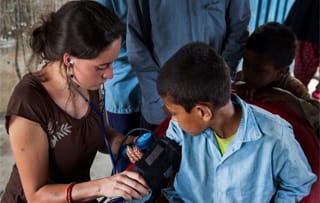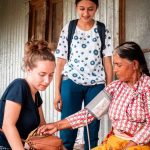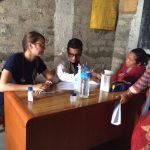
Public Health Program is designed to address the need of rural communities on public health issues such as health, hygiene and sanitation. Our organization has been working with the Public Health Centers for the improvement of health indicators in the local context through public health initiatives, researches on communicable and non-communicable diseases and prevention and control for the community wellbeing.
In Nepal, the health indicators are in alarming:
- The under-five, mortality rate is 32%,
- 27% of children under five are malnourished
- and maternal mortality rate (MMR) is 258 per 100,000 live births.
Access to proper health and sanitation facilities is often very limited and awareness of good hygiene practices is low. About 19% of the population are deprived of sanitation facilities and 17% of the population do not have access to clean drinking water in the communities. Unsurprisingly, many health problems stem from a lack of basic hygiene and sanitation practices such as open defecation.
These problems are exacerbated by orthodox, religious and superstitious beliefs, which lead the sick to seek the help of a witch doctor, rather than a medical one.
Ensuring access to health care and public health initiatives are big challenges in developing nations like Nepal. The main institutions that delivered basic health services in 2017-18 were the 125 public hospitals including other ministries, the 1,822 non-public health facilities, the 198 primary health care centers and the 3,808 health posts (Annual Report Department of Health Services 2074/75). The government efforts alone are not enough to address the delivery of health services to the poor in Nepal. Some individuals, National and International Non-governmental organizations are also doing servic
The goal of Public Health is to create healthy communities by controlling and preventing diseases and increasing access to health, hygiene, sanitation education and facilities. Our public health volunteer / internship project is dedicated to improving public health in rural disadvantaged communities through health services and education. We are looking for volunteers or interns to join our public health project in Nepal and sustainably change the health, and hygiene of Nepal’s rural people.
Public health volunteers and interns’ responsibilities are to assist VIN’s team from planning process to project implementation, monitoring and evaluation. The public health volunteers and interns will be deployed in varied roles such as observe health services and status; research public health related hazards and issues; help develop / design public health plan, policies, education courses and facilitate awareness education; qualified public health and health care personals resource mapping.
We invite all interested public health and medical care students and healthcare professionals to join our public health and medical care program and make a difference for the communities in need. As a public health volunteer, you will be doing one or more of the following specific activities based on your previous work experience, areas of studies and the need at the time of your deployment:
- Plan, design and implement public health project to improve health standards of community.
- Conduct awareness raising sessions to children’s clubs, women’s groups and other community stakeholders on water and sanitation hygiene (WASH) and nutrition and waste management.
- Conduct awareness raising sessions on the importance of safe drinking water.
- Organize workshops on waste management by highlighting the importance of 3Rs (reuse, reduce and recycle) for environmental sanitation.
- Provide individual and group counseling sessions for community people.
- Conduct awareness sessions on communicable and non-communicable diseases and how to fight them.
- Design or use monitoring tools, like as screening, lab records, and vital information, to recognize health risks.
- Develop tools to address behavioral causes of diseases.
- Carry out epidemiological research of acute and chronic diseases.
- Prepare precautionary health reports which include problem explanations, analyses, alternate solutions, and suggestions.
- Design, implement, or assess health service delivery systems to enhance the health of specific communities.
- Respond to environmental disasters or other crisis situations.
- Collect and analyze data.
- Plan and conduct public health studies.
Project Specific Skills
- Planning, research, training and facilitation, knowledge on public health, WASH, report writing
Desirable/ Common Skills
- Excellent communicator with good interpersonal skills
- A team player with good workethics
- Time management and leadership qualities
- Adaptable, flexible and able to work under pressure
- Accepting of different ideas and culture
- Problem solving: always be part of solutions than part of a problem
- Creative
- Positive attitude
Requirements
- Gender: Female / Male
- Minimum Age: 18+ years (16-17 years old person can volunteer but need to present parents’/ guardian’s consent letter)
- Language:English (Intermediate)
- Educational:High School Graduate
Your Experience/ Setting
Upon your arrival at Kathmandu Tribhuvan International Airport (TIA), you will receive a warm welcome and be transported to your hotel or hostel. If you are already in Nepal before the start of your placement, we can make alternative arrangements for you. You will undergo a comprehensive two- to three-day induction program after arrival. This induction will provide valuable information about your project and general information about the Nepalese language, culture, health, safety, and security. It is also an excellent opportunity to connect with fellow volunteers and interns who can become your companions for sightseeing and a source of support throughout your volunteer placement.
During the induction period, you will be accommodated in a budget hotel or hostel arranged by VIN. However, most of the VIN experience involves living with a Nepalese host family. While this immersion is essential for a complete experience, we understand that it can be challenging as you adapt to a new culture and adjust to facilities that may be more basic than you are accustomed to. Don’t worry; all our host families have experience accommodating volunteers, although their English-speaking abilities may vary. Also, you will have 24-hour access to our staff members for support and assistance throughout your placement.
Volunteers will be assigned to one of VIN’s working areas, which include Tarakeshor Municipality in Kathmandu, Taluwa, Thulachhap, and Bhadaure in Okhaldhunga, and Okharpouwa and Kaule in the Nuwakot district. While at the working site, volunteers are requested to bring their lunch box, water bottle, safety gear, face mask, and any other essential belongings. We advise volunteers to dress comfortably and modestly, preferably with long sleeves. Please get in touch with us for guidance and support if you want to raise project funds or collect project-specific resources. This will help the community a lot.
Schedule and Commitment
You will work five to six days a week, up to six hours per day. You may propose your preferred time and hours; however, the working time period will be dependent on the institution you have been placed. A minimum of 2 weeks’ time commitment is expected of a volunteer. The longer you commit; the better impact you can make. You should be willing to commit a certain amount of your free time and energy, show a lot of commitment and be a good listener. You are expected to work constructively and co-operatively maintaining good reputation and standards at all times. Volunteer should abide by relevant security concerns and access procedures. Moreover, you should be receptive and positive to performance appraisal, advice and feedback. Throughout your placement, you will have the full support of VIN. Your safety is our highest priority.
Your typical day might look like this:
| 07:00-08:00 | Tea/Leisure Time |
| 08:00-09:00 | Breakfast/Brunch (Nepali meal – Daal-Bhaat) |
| 09:00-10:00 | Preparation for sessions |
| 10:00-13:00 | Deliver training sessions/Workshops to students |
| 13:00-14:00 | Lunch (Packed lunch) |
| 15:00-17:00 | Deliver sessions/Awareness to community people |
| 17:00-20:00 | Preparation for next day/Leisure time |
| 20:00-21:00 | Dinner (Nepali meal – Daal-Bhaat) |
You will receive a clear and concise on-the-job instructions, course of action, context of work and policies/strategies before your placement begins. You will be provided with ample of guidance and support throughout the placement with trainings / onboarding sessions incase necessary. You will be in a constant communication and regular check-in with the VIN volunteer coordinator. VIN aims to maintain a culture of continuous feedback between the volunteer supervisor at the placement to monitor the performance of the volunteer and ensure the project delivers desired outcomes.
In case of an emergency, you may contact one of our Volunteer Coordinators who will be available anytime for your assistance and support.
Click here to Learn more on how volunteering works
Mid and Long Term Volunteers:
2 weeks minimum stay- € 380
3 weeks – 480€
4 weeks – 580€ (after 4th week, for each additional week €95)
University Internships:
4 weeks minimum stay- € 680 (for each additional week – €105
Click here to Learn what’s included and excluded in our Fees Section
Click here to Learn recruitment process on how volunteering works
Our projects are open year-round, and our inductions begin on the first and third Mondays of each month. We would like to ask that volunteers arrive one day before the start of the induction. You can choose the duration of your participation based on your available time. However, so that you know, our volunteering placements are limited. We highly recommend booking your placement in advance to secure your placement. Click here to apply.




 Member of
Member of